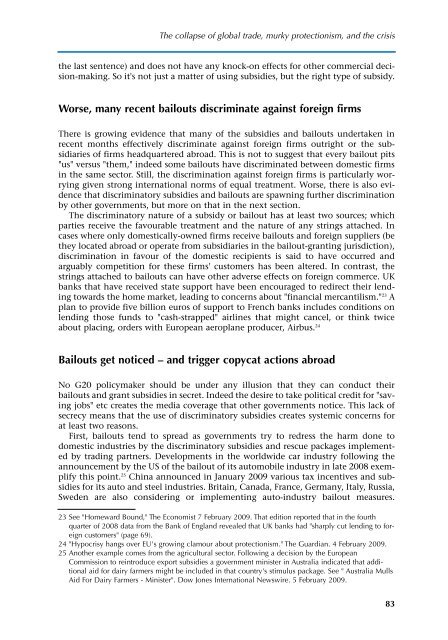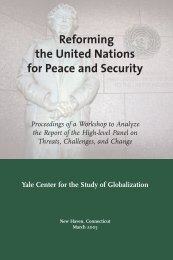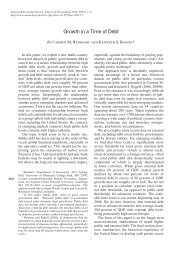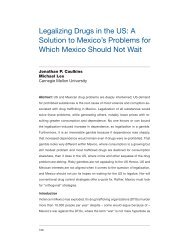The collapse of global trade, murky protectionism, and the crisis:
The collapse of global trade, murky protectionism, and the crisis:
The collapse of global trade, murky protectionism, and the crisis:
Create successful ePaper yourself
Turn your PDF publications into a flip-book with our unique Google optimized e-Paper software.
<strong>The</strong> <strong>collapse</strong> <strong>of</strong> <strong>global</strong> <strong>trade</strong>, <strong>murky</strong> <strong>protectionism</strong>, <strong>and</strong> <strong>the</strong> <strong>crisis</strong><br />
<strong>the</strong> last sentence) <strong>and</strong> does not have any knock-on effects for o<strong>the</strong>r commercial decision-making.<br />
So it's not just a matter <strong>of</strong> using subsidies, but <strong>the</strong> right type <strong>of</strong> subsidy.<br />
Worse, many recent bailouts discriminate against foreign firms<br />
<strong>The</strong>re is growing evidence that many <strong>of</strong> <strong>the</strong> subsidies <strong>and</strong> bailouts undertaken in<br />
recent months effectively discriminate against foreign firms outright or <strong>the</strong> subsidiaries<br />
<strong>of</strong> firms headquartered abroad. This is not to suggest that every bailout pits<br />
"us" versus "<strong>the</strong>m," indeed some bailouts have discriminated between domestic firms<br />
in <strong>the</strong> same sector. Still, <strong>the</strong> discrimination against foreign firms is particularly worrying<br />
given strong international norms <strong>of</strong> equal treatment. Worse, <strong>the</strong>re is also evidence<br />
that discriminatory subsidies <strong>and</strong> bailouts are spawning fur<strong>the</strong>r discrimination<br />
by o<strong>the</strong>r governments, but more on that in <strong>the</strong> next section.<br />
<strong>The</strong> discriminatory nature <strong>of</strong> a subsidy or bailout has at least two sources; which<br />
parties receive <strong>the</strong> favourable treatment <strong>and</strong> <strong>the</strong> nature <strong>of</strong> any strings attached. In<br />
cases where only domestically-owned firms receive bailouts <strong>and</strong> foreign suppliers (be<br />
<strong>the</strong>y located abroad or operate from subsidiaries in <strong>the</strong> bailout-granting jurisdiction),<br />
discrimination in favour <strong>of</strong> <strong>the</strong> domestic recipients is said to have occurred <strong>and</strong><br />
arguably competition for <strong>the</strong>se firms' customers has been altered. In contrast, <strong>the</strong><br />
strings attached to bailouts can have o<strong>the</strong>r adverse effects on foreign commerce. UK<br />
banks that have received state support have been encouraged to redirect <strong>the</strong>ir lending<br />
towards <strong>the</strong> home market, leading to concerns about "financial mercantilism." 23 A<br />
plan to provide five billion euros <strong>of</strong> support to French banks includes conditions on<br />
lending those funds to "cash-strapped" airlines that might cancel, or think twice<br />
about placing, orders with European aeroplane producer, Airbus. 24<br />
Bailouts get noticed – <strong>and</strong> trigger copycat actions abroad<br />
No G20 policymaker should be under any illusion that <strong>the</strong>y can conduct <strong>the</strong>ir<br />
bailouts <strong>and</strong> grant subsidies in secret. Indeed <strong>the</strong> desire to take political credit for "saving<br />
jobs" etc creates <strong>the</strong> media coverage that o<strong>the</strong>r governments notice. This lack <strong>of</strong><br />
secrecy means that <strong>the</strong> use <strong>of</strong> discriminatory subsidies creates systemic concerns for<br />
at least two reasons.<br />
First, bailouts tend to spread as governments try to redress <strong>the</strong> harm done to<br />
domestic industries by <strong>the</strong> discriminatory subsidies <strong>and</strong> rescue packages implemented<br />
by trading partners. Developments in <strong>the</strong> worldwide car industry following <strong>the</strong><br />
announcement by <strong>the</strong> US <strong>of</strong> <strong>the</strong> bailout <strong>of</strong> its automobile industry in late 2008 exemplify<br />
this point. 25 China announced in January 2009 various tax incentives <strong>and</strong> subsidies<br />
for its auto <strong>and</strong> steel industries. Britain, Canada, France, Germany, Italy, Russia,<br />
Sweden are also considering or implementing auto-industry bailout measures.<br />
23 See "Homeward Bound," <strong>The</strong> Economist 7 February 2009. That edition reported that in <strong>the</strong> fourth<br />
quarter <strong>of</strong> 2008 data from <strong>the</strong> Bank <strong>of</strong> Engl<strong>and</strong> revealed that UK banks had "sharply cut lending to foreign<br />
customers" (page 69).<br />
24 "Hypocrisy hangs over EU's growing clamour about <strong>protectionism</strong>." <strong>The</strong> Guardian. 4 February 2009.<br />
25 Ano<strong>the</strong>r example comes from <strong>the</strong> agricultural sector. Following a decision by <strong>the</strong> European<br />
Commission to reintroduce export subsidies a government minister in Australia indicated that additional<br />
aid for dairy farmers might be included in that country's stimulus package. See " Australia Mulls<br />
Aid For Dairy Farmers - Minister". Dow Jones International Newswire. 5 February 2009.<br />
83





